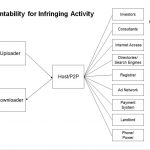
New Ebook on Zeran v. AOL, the Most Important Section 230 Case (Techdirt Cross-Post)
[Cross-posted from Techdirt] Section 230 has become a mainstream discussion topic, but unfortunately many discussants don’t actually understand it well (or at all). To address this knowledge gap, co-editors Profs. Eric Goldman (Santa Clara Law) and Jeff Kosseff (U.S. Naval…
512(f) Claim Against Robo-Notice Sender Can Proceed–Enttech v. Okularity
Okularity “represents” several photography clearinghouses. This means that Okularity’s robots scour the Internet looking for clearinghouse photos and then send automated takedown notices for alleged infringements. “Okularity waits until the notices accumulate to the point when a social media platform…

YouTube Defeats Lawsuit Over Cryptocurrency Scam–Ripple v. YouTube
Ripple Labs developed a cryptocurrency called XRP. Scammers phished verified YouTube accounts and then used the hijacked accounts to post YouTube videos–seemingly from Ripple–inducing consumers to transfer their XRP, where they were stolen. YouTube allegedly responded to takedown notices slowly….

The Case Against Holding Amazon Liable for Third-Party Merchants’ Sales in its Marketplace (WSJ Cross-Post)
[In February 2020, I participated in a Wall Street Journal “debate” on the question: “Should Amazon Be Responsible When Its Vendors’ Products Turn Out to Be Unsafe?” The proponent was Ted Janger from Brooklyn Law School. I was the opponent….

Copyright Plaintiffs Can’t Figure Out What Copyrights They Own, Court Says ¯\_(ツ)_/¯
This is one of several cases where major copyright owners are trying to punish Internet access providers (IAPs) for alleged infringements by their subscribers. Earlier this year, the court refused to dismiss the lawsuit in an opinion I described as…

QAnon Conspiracy Theorists Can’t Force YouTube to Carry Their Videos–Doe v. Google
This lawsuit is peak 2020. The plaintiffs dubiously characterized themselves as “‘extremely controversial’ ‘conservative news’ channels,” and they claim YouTube tossed them overboard due to its alleged anti-conservative bias. I don’t know the word “conservative” means in the Trump era,…

Snapchat Isn’t Liable for Its Speed Filter (Even if Section 230 Doesn’t Apply)–Maynard v. Snapchat
Snapchat’s “speed filter” allows users to overlay their speed on their content. Unsurprisingly, some users viewed this as a challenge to capture a high speed on their speed filter; and in the course of doing so, tragedy could occur. In…

Constitutional Challenge to Trump’s Anti-230 EO Fails–Rock the Vote v. Trump
[IF YOU HAVEN’T ALREADY DONE SO, PLEASE PLEASE PLEASE VOTE!] This is one of two lawsuits challenging the constitutionality of Trump’s anti-Section 230 executive order from May. Because the EO said a lot (mostly lies) but did very little, the…
A 512(f) Case Leads to a Rare Damages Award (on a Default Judgment)–California Beach v. Du
[VOTE EARLY AND IN-PERSON OR VIA OFFICIAL DROPOFF BOXES. DON’T RELY ON THE USPS TO DELIVER THE MAIL ON TIME!] The plaintiff sells “Pop N Go” playpens. Allegedly, up to 98% of the plaintiff’s revenues come from Facebook and Instagram….

Yet Another Twitter Account Suspension Case Fails–Jones v. Twitter
Jones had a Twitter account @aboxoffrogs. Twitter permanently suspended the account for hateful conduct. Jones sued Twitter (pro se) for (1) defamation, (2) tortious interference, (3) aiding and abetting, (4) conspiracy, (5) ratification, (6) retraction, (7) violation of Section 230(c),…
